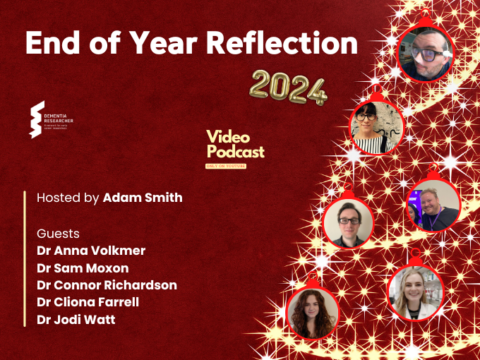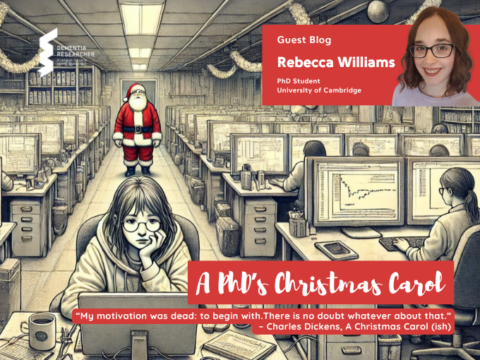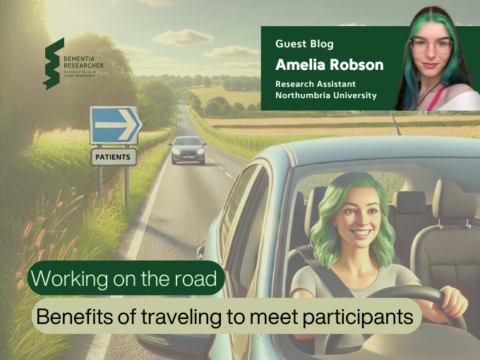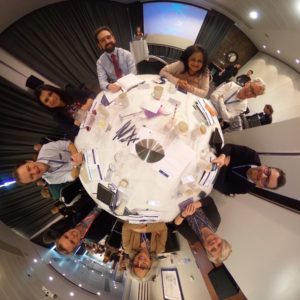
My table group – includes Martin Knapp, Adam Gordon, Esme Moiz-Cook and more.
Earlier this month I was fortunate enough to be invited to attend the Dementia Care Research Summit organised by Alzheimer’ Society, National Institute for Health Research (NIHR) and Economic and Social Research Council (ESRC). Attending inspired me to write a blog to reflect on my own take-aways from the day.
But first, a little reflection on some of the history that led to summit….
I started working at the NIHR in November 2010, and one of the very first things I was asked to consider was how we could address issues with delivery of research in care homes (We created ENRICH in response). Within twelve months the governments Ministerial Advisory Group for Dementia Research (MAGDR) had reported and called for dementia research to be brought up the list of research priorities, for there to be more funding opportunities, better public engagement and improvements in research translation. Around the same time there came an injection into research funding, through the NIHR dementia themed call and a little later through joint funding programmes with the NIHR and Economic and Social Research Council (ESRC).
The announcements around which studies were to be funded didn’t follow for quite some time, however when news of which studies had been funded did finally break, dementia care featured heavily. The following year the James Lind Alliance / Alzheimer’s Society Priority Setting Partnership reported, and the public voice came across loud and clear: care, care, care! Along with that report came more funding from the Alzheimer’s Society for care research, more funding for PhD’s and postdocs… and you could almost say that the rest is history! Dementia care research funding has gradually increased (although not at a pace that many would like) and the dementia care research field and community of researchers working in this area grown. Even the Neurologists at the Alzheimer’s Association International Conference in 2020, suggested ‘care’ should be better researched.
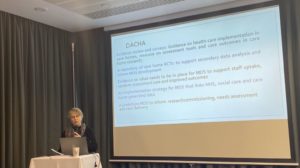
Professor Claire Goodman presenting
Of course this isn’t to say that dementia care research suddenly became a ‘thing’ in 2010. Many of the researchers who presented at the summit had been around for years (not mentioning any names!). However, I think it is around this time that there was a recognition that more was needed and could be done!
Back to today!
Despite the big increase in the number of early career researchers looking at care (Just my own view, as there seems to be very little data published on actual numbers), dementia care research still only represents around 12% of all dementia research funding (in Europe according to a recent JPND report). Is this enough?
At the start of the summit we were asked to reflect and share some of the achievements to date. Here are just a few of the highlights from the presenters:
- Growth in patient and public involvement.
- Improvements in NHS staff training and dementia awareness.
- NIHR and charity initiatives such as Enabling Research in Care Homes (ENRICH), Join Dementia Research and even the Dementia Researcher service (all of which I am rather proud to have had a hand in).
- The research studies that have taken place over the past few years, including Optimal Study / Peach Study / Marque Study / Start Study / PRIDE Study / IDEAL Study.
- Reduction in use of anti-psychotics and increase in dementia diagnosis rates.
Over the rest of the day we heard from some of the leading people from across the field, looking at the latest initiatives to enable care research, some new perspectives and exploring what a care network might look like. My highlights…
- All too often we research by “body parts of disease”, but with care there is a chance to do things differently, to look at care and the disease together.
- Dementia care needs continued investment, and there are still some major issues to tackle e.g. excess treatment costs.
- UK Dementia Research Institute Care and Technology theme is focussed on how technology can support care.
- Personalised assessments and adaptive trial designed may hold the key.
- Contributions from outside academia are making a major contribution, with initiatives such as the DEEP Network / Dementia Diaries / Meeting Centres
- 70% of people with dementia live in the community, not in care homes, yet much of care research has focussed on care homes and NHS care.
- There is a lot we can learn from how cancer research co-ordinates and organises its research and themes to avoid duplication and overlap.
- There is still a lot of confusion and debate around volunteer study consent and data sharing.
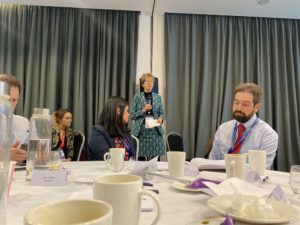
Dr Louise Wood CBE
Director – Science, Research & Evidence
Department of Health & Social Care – providing closing remarks
Honestly, I probably haven’t done this justice! Trying to summarise a 7-hour summit into a few paragraphs and bullet points is pretty tricky! The good news is that Alzheimer’s Society recorded the whole thing (from the live stream), and by the time this blog is published, you should be able to watch for yourself (although you may want to spread over a few sittings).
I am sure the organisers will share the formal outcomes / recommendations from the event. But here are my top 10 take-aways (not in any particular order):
- We need to focus more research on care outside of the NHS and Care Home setting – care homes have been a major focus over the past 10 years (rightly so), but with 70% of people living with dementia residing in the community, more research about what good social care, home care and community care looks like is essential – for care providers, formal and informal carers.
- Implementation, not just dissemination – more funding and more focus on translating the learning from care research studies into something that is actually used. This will mean better collaboration with the ARCs, and an agreement on where responsibility for implementation sits. I think there needs to be a pathway and handover point, where researchers pass along their findings, to experts on implementation. This means that implementation needs to be more than ‘grants for researchers, to implement’. Let’s have more money and give it to people to implementation (Social Services, NHS or maybe a new dedicated implementation organisation).
- Better sharing – this could be grouped with implementation, but I think it is a little different. What is needed is some better way to share coordinate research efforts, funding call and importantly the outputs, and ongoing news, from studies. We need more than just journal publications and press releases. We need implementation guidance and real study implementation tools Some form of platform, that carers, care home staff, NHS and the wider public, can access would be really helpful.
- Supporting early career researchers – a sustained and properly funded campaign and network to continue attract undergraduates to consider working in the field of dementia research (and care research), and then having attracted more people, some thought needs to go into how to retain people. The current PhD / Clinical Academic / Fellowship programme has to0 many gaps, and as a result many people leave academia post PhD, or simply return to their clinical jobs.
- Attracting non-academics / funding community research – recently research funding has been put into the hands of the public, allowing them to choose what to research. I think that with the right support, more of this would produce some interesting results. Passionate carers, former carers and people living with dementia are mostly included in the research process these days (not only as participants). However, taking this one step further with more ‘co-production’, with a truly equal collaboration will provide meaningful results. The National Lottery, Alzheimer’s Society and Alzheimer’s Research UK have already funded this kind of research, so more would be great!
- Inside the NHS – there have been massive improvements in the NHS. However, we still see regular reports of how varied that care can be, so now is not the time to sit back and relax, and think job done. We need to continue to develop NHS training, and care pathways to ensure that the NHS services and staff in these areas are benefitting from the research, conducting their own research, and always striving to improve and consistently provide the best possible care.
- More money – more research and improvements in care and social care will cost money. There is no way of dodging this issue (although I am sure there are always some efficiencies that can be released to better use the money we have). In a highly pressured system with high vacancy rates, increasing numbers of people needing help, delivering research and acting on research outcomes will be easier if there is more money and stretch in the system.
- Learning from other countries and fields – presentation from researchers in the US and from colleagues in cancer, demonstrated that there is always something to learn. This is easier said than done… after all, just where does the responsibility for this lie? This takes time, and money and someone to take responsibility for leading, sharing and then driving use of what we learn.
- Stretch and use what we already have – having personally played a role in the creation of NIHR initiatives such as ENRICH, Join Dementia Research and Dementia Researcher I am passionate about spreading the word. Letting everyone know that these resources are there to be used (along with many other support systems e.g. Research Design Service, UK Dementias Platform, Alzheimer’s Society forums etc.). These great services are currently underutilised. The platform I mentioned earlier, and training, may improve awareness of these but we need to ensure that researchers, at all career stages are making use of these tools. Continuing to communicate and making access simple and easy is important.
- Keep up the good work and celebrate success – it is easy in a blog like this to say what more can be done, to spot the gaps. In every part of the summit agenda (not only the part that asked the question, ‘What more can be done’) everyone who took to the stage went on to say what could be done better. Self-reflection is good, but we should also get better at celebrating success!
If you made it this far… well done! These are just my thoughts, so I strongly encourage you to take time to watch the recording of the live-stream (which are all available on the Alzheimer’s Society YouTube Channel). But to summarise, this was a great event, and I notice a theme which has been followed by events in the US and Australia within the last week – I look forward to seeing how the takeaways from this summit are realised in the policies of the charities and in government. I feel that the research community, and people living with dementia and their carers, who are, and should continue to be at the heart of this agenda are more than ready to rise to the challenge!
Dr James Pickett, the Alzheimer’s Society Head of Research, organised this event -his swansong before moving on to a new role and a new disease. He has been a dedicated, passionate and driven lead for this field, and I wanted to take a moment to personally thank him for his work and support – good luck James, dementia research will miss you!
Finally, I recorded a podcast earlier this week discussing the Dementia Care Research Summit. So watch our feed at 7am on Monday 2nd March, and tune-in soon to hear me talk with Hannah Churchill from the Alzheimer’s Society and care researchers Dr Tamara Backhouse from the University of East Anglia and Dr Keir Yong from University College London.
Author
Adam Smith is Programme Director in the Dementia Biomedical Research Centre at University College London. Funded by the NIHR he has led a number of initiatives to support achievement of the 2020 Dementia Challenge (which happens to include creating this website, Join Dementia Research and ENRICH), as well as pursuing his own research interests and collaborating with The University of Sydney on their national study recruitment register. In his spare time, he grows vegetables, builds Lego and spends most of his time squeezing technology into his house.
You can follow Adam on Twitter Follow @betterresearch

 Print This Post
Print This Post

